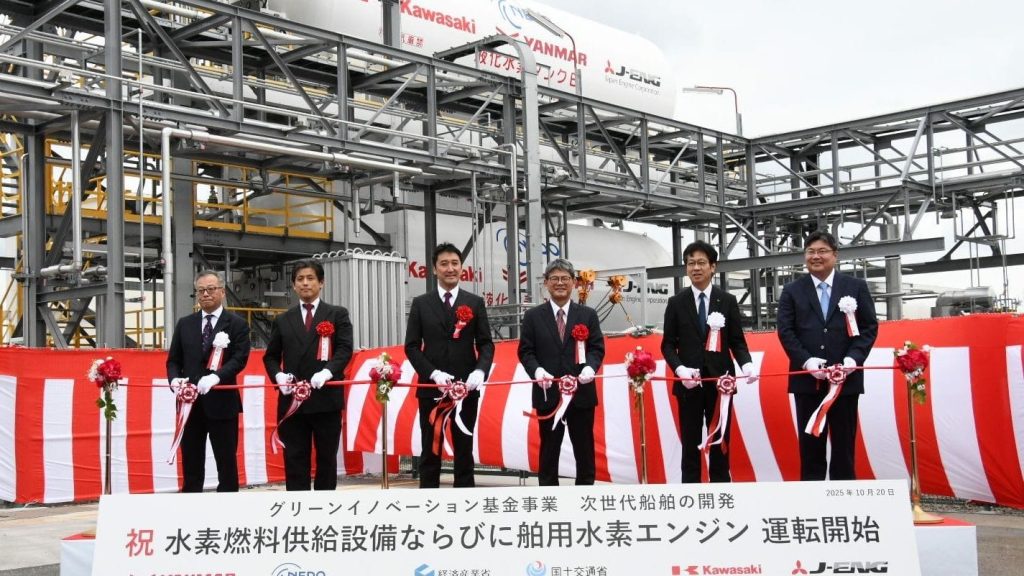Kawasaki Heavy Industries, Yanmar Power Solutions and Japan Engine Corporation complete the first onshore test of marine hydrogen engines.
The project, funded under Japan’s ¥2 trillion Green Innovation Fund, supports the nation’s 2050 carbon neutrality goal.
The dual-fuel hydrogen engines reduce GHG emissions while preserving operational redundancy for deep-sea vessels.
Japan Tests Marine Hydrogen Engine on Land
Japan’s drive to decarbonize global shipping has taken a decisive step forward with the world’s first land-based operation of marine hydrogen engines. The test, conducted jointly by Kawasaki Heavy Industries, Yanmar Power Solutions and Japan Engine Corporation, demonstrated stable hydrogen combustion for ship engines designed to propel next-generation zero-emission vessels.
The trial, carried out at Japan Engine’s headquarters factory, used a newly installed liquefied hydrogen fuel supply system that delivers fuel at both high and low pressure—enabling testing across a range of marine engine types.
The achievement forms part of Japan’s Green Innovation Fund Projects, managed by the New Energy and Industrial Technology Development Organization (NEDO). The initiative is a key component of Japan’s 2050 carbon neutrality strategy, backed by the Ministry of Economy, Trade and Industry (METI).
Inside the Demonstration
Under NEDO’s “Development of Marine Hydrogen Engine and MHFS” programme, Kawasaki Heavy Industries engineered a liquefied hydrogen fuel supply system capable of storing and vaporising liquid hydrogen for delivery to partner engines. The system’s versatility allows testing across multiple applications, including low-speed two-stroke propulsion units, medium-speed auxiliary engines and main generator engines for electric-propulsion ships.
Kawasaki and Yanmar successfully demonstrated hydrogen combustion in medium-speed four-stroke engines, confirming stable operation at rated output—a critical milestone towards zero-emission power systems. Japan Engine is continuing development of a low-speed, two-stroke hydrogen engine, with first operation scheduled for spring 2026.
All three engines employ a dual-fuel configuration, switching between hydrogen and diesel. This design preserves safety and operational redundancy while enabling substantial greenhouse gas reductions during hydrogen use.
Strategic Significance for Maritime Decarbonization
International shipping, which contributes nearly 3% of global emissions, faces mounting regulatory pressure to decarbonise. The International Maritime Organization (IMO) has set a target to achieve net-zero GHG emissions “by or around 2050,” prompting governments and shipbuilders to pursue scalable, alternative-fuel solutions.
Hydrogen is emerging as a key contender for deep-sea decarbonisation, though challenges around storage, distribution and combustion stability remain significant. Japan’s demonstration offers early evidence that liquefied hydrogen can be safely and effectively used for maritime propulsion when supported by advanced fuel systems and dual-fuel flexibility.
“Liquid hydrogen is a vital key to realising a sustainable energy society, and we have long been committed to building the technological foundation to support it,” said Kei Nomura, Executive Central Manager of Kawasaki Heavy Industries’ Hydrogen Strategy Division. He added that the company’s expertise in hydrogen production, storage, transportation and reception places it in a strong position to advance hydrogen-fuelled shipping globally.
RELATED ARTICLE: Airbus Reveals Hydrogen-Powered Zero-Emission Engine
Governance and Funding Context
The Green Innovation Fund, established by METI and managed by NEDO, channels approximately ¥2 trillion (US$13 billion) into technologies aligned with Japan’s Green Growth Strategy. The fund supports decarbonisation across key industrial sectors, including mobility, energy and materials.
The marine hydrogen project benefits from this framework, bridging R&D with pre-commercial testing. Additional government allocations—¥300 billion in FY2022 and ¥456 billion in FY2023—reflect Japan’s continued emphasis on hydrogen infrastructure and its role in national energy resilience.
By integrating technology development with policy support, Japan is positioning itself as a first mover in hydrogen propulsion—laying the groundwork for commercial deployment of zero-emission vessels that could transform maritime logistics and trade routes.
Next Steps and Global Implications
Following the successful land-based trial, Kawasaki, Yanmar and Japan Engine plan to collaborate with shipowners and shipyards to conduct onboard demonstrations. These real-world trials will validate engine performance and safety in operational conditions, a prerequisite for regulatory approval and commercial rollout.
The consortium aims to standardise hydrogen engine systems for global shipbuilders, enabling future vessels to run partially or fully on hydrogen. Their success could accelerate the transition of international shipping fleets toward carbon neutrality, aligning industrial technology with the IMO’s decarbonisation roadmap.
By converging Japanese engineering capability, state-backed innovation funding, and global ESG imperatives, the initiative underscores Japan’s strategic ambition to lead in maritime energy transition—and set a technological precedent for hydrogen-powered shipping worldwide.
Follow ESG News on LinkedIn

